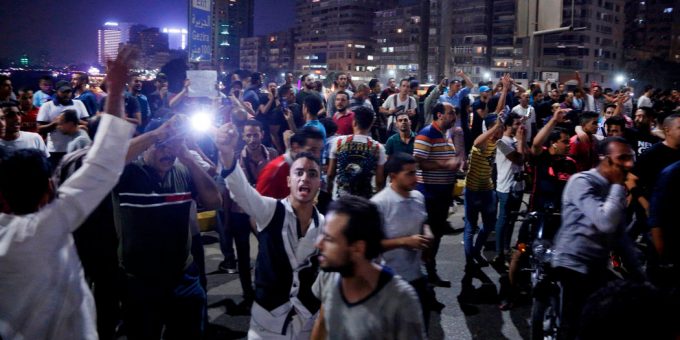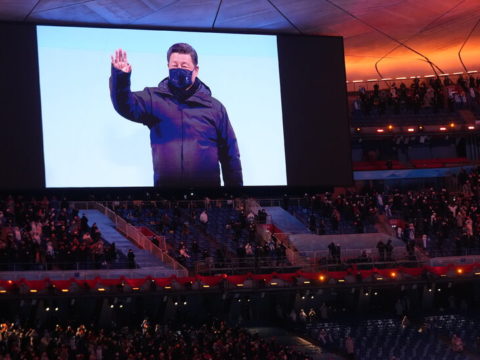
CAIRO — Under the government of President Abdel Fattah el-Sisi of Egypt, so little dissent is allowed — and what little there is comes at such a high price — that when just a few hundred people across the country called for Mr. el-Sisi’s ouster in a burst of scattered protests on Friday night, it came as a shock.
The apparent trigger for the demonstrations was almost as unexpected: Mohamed Ali, a 45-year-old construction contractor and part-time actor who says he got rich building projects for the Egyptian military and then left for Spain to live in self-imposed exile, where he began posting videos on social media accusing Mr. el-Sisi of corruption and hypocrisy.
In the three weeks since his first video appeared, Mr. Ali has reinvented himself as a whistle-blower, an el-Sisi antagonist and a protest guru, and his tales of corruption at the top have transformed him into a leading voice of opposition to the president. When the protests erupted, it was at the time and date Mr. Ali had urged from afar.
But the extent, and durability, of Mr. Ali’s out-of-nowhere influence — and his ability to spur further demonstrations — remains to be seen. His surge from obscurity to prominence has also raised questions in Egypt about whether his sudden fame has been helped along or exploited by powerful interest groups in the country, inside or outside the government.
“It is sort of odd,” said Amy Hawthorne, the deputy director for research at the Project on Middle East Democracy. “Who is this person, who is he connected to, what led him to come out with these allegations now? Obviously he’s very well connected, but who exactly are his connections?”
To at least some of protesters, Mr. Ali was less an inspiration than an opportunity to vent their frustrations.
“I protested because the way Sisi is ruling is wrong and disgraceful,” said Ali Mohamed, 19, a resident of the working-class Cairo neighborhood of Boulaq who live-streamed some of the Tahrir Square demonstrations on Friday. “Egypt deserves better than for its land to be sold out or for its people to be imprisoned.”
He added: “People were just waiting for the opportunity to protest — Mohamed Ali’s videos are not the real reason why they did. The reason is that people wanted to take action.”
On Saturday evening, about 200 protesters in the Red Sea city of Suez were met with police officers firing rubber bullets, according to posts on social media and a witness.
In Cairo, however, there did not appear to be any signs of further protests. The police pre-emptively flooded Tahrir Square on Saturday, where mass demonstrations during the Arab Spring eight years ago brought down President Hosni Mubarak and raised hopes for democratic change.
The test of just how deep Mr. Ali’s influence is could come as soon as this week. In a video posted Saturday evening, Mr. Ali called for a new round of protests against Mr. el-Sisi to take place this coming Friday.
“We should stop making gods out of presidents,” he said in the video, exhorting the military to remove Mr. el-Sisi from power.
Though the police did not kill any protesters on Friday, the security forces have not hesitated to use deadly force in the past, and Mr. el-Sisi is likely to order a swift and thorough crackdown if the protests persist.
Since coming to power in a 2013 military takeover, Mr. el-Sisi has cemented his hold through harsh repression that has silenced critics and curtailed free speech.
An Egyptian monitoring group, the Egyptian Center for Economic and Social Rights, said on Sunday that at least 274 people had been arrested at the protests, and that some demonstrators had reported being beaten and tear-gassed.
Given the gravity of the possible consequences, observers were stunned protesters had dared to show up at all, apparently moved by little more than a man with a webcam waging a campaign against Mr. el-Sisi from the safety of Spain.
But the Facebook videos Mr. Ali posts under the name “Mohamed Ali Secrets” have become must-see TV among young, social media-savvy Egyptians, who tune in every day or two to watch him talk to the camera, chain-smoking as he cheerfully insults Mr. el-Sisi as a “midget” and a “disgrace.” There have been at least 35 so far.
In working-class, colloquial and often potty-mouthed Arabic, he muses on the military’s growing domination of the Egyptian economy. He complains of being owed millions of dollars by the government for construction work. He accuses Mr. el-Sisi of wasting government funds on vanity projects like multimillion-dollar presidential palaces.
“The system has made us all corrupt,” he said in one video. “We are going to change that system and install a proper one.”
Mr. Ali’s gravel-voiced exposés have resonated with many Egyptians, who have watched Mr. el-Sisi erect enormous building projects while their own finances collapse. The government reported in July that one in three Egyptians were living in poverty.
The video monologues have been repeatedly taken down from Facebook, under unclear circumstances, but not before accumulating millions of views. On Twitter, Egyptians joked that his episodes were better than Netflix.
Then last week, Mr. Ali called for viewers to take to the streets Friday evening after a soccer game between two popular Egyptian teams. That appeared to let loose hundreds of Egyptians — many of them young, working-class men — who participated in protests in a scattering of cities around the country, including in Tahrir Square and the poor neighborhood of Warraq Island in Cairo, as well as in Alexandria, Suez and El-Mahalla El-Kubra.
But beyond the fact that the protests erupted when Mr. Ali called for them, theories far outweighed the available information about his precise role. Some observers speculated Mr. Ali may be a puppet controlled, at least in part, by another entity, possibly people in Mr. el-Sisi’s government who are seeking to undermine or even overthrow the president, who is out of the country attending the United Nations General Assembly this week.
“The entire thing is a little bit fishy,” said Khaled Dawoud, a longtime journalist and spokesman for one of Egypt’s all-but-defunct opposition parties. “He didn’t introduce himself as a politician. He’s more like a whistle-blower, and suddenly he decided to turn into a revolutionary leader.”
Others wondered whether the protests had truly been spontaneous, or if they had been orchestrated by opposition groups like the Muslim Brotherhood, the Islamist group that Mr. el-Sisi has sought to throttle ever since he came to power in a coup that deposed President Mohamed Morsi, a member of the Brotherhood who was also Egypt’s first democratically elected leader.
Mr. Dawoud said the opposition, which has lost much of its leadership to prison or self-imposed exile, was waiting to see how the protests evolved — and to identify who exactly was protesting — before jumping in.
Those who support the president say the Brotherhood is likely to be quietly organizing the protests. Though public opinion is difficult to gauge accurately in Egypt, they say many Egyptians support Mr. el-Sisi’s economic overhauls and the stability he has brought in a time of turmoil across the region.
“The trains go and run on time. We lacked that for two and a half years,” said Moataz Abdel Fattah, a pro-Sisi political scientist. “The great majority of Egyptians would say, ‘No, hold on, you cannot drive the country into some sort of waterfall.’”
Most protesters on Friday appeared to be young men in their teens or early 20s who were children during the upheavals of 2011 and 2013, when protests brought down two successive presidents.
Good-looking and fit, Mr. Ali may be seen as something of a folk hero, analysts said — an uneducated man who made millions and who is now riding to the rescue of the working classes. He does not speak like a democracy activist or a politician, but like one of them — or, perhaps, who they would like to be.
“He resonates with a wider sector of Egyptians in a way that no one before him ever did,” said Rabab el-Mahdi, a political scientist at the American University in Cairo. “They look at him and see a successful version of themselves.”
It is perhaps not surprising that Mr. Ali exudes on-camera charisma. A movie in which he stars and also produced, about young Egyptians making the dangerous journey across the Mediterranean to Europe, won the 2019 Outstanding Art for Peace prize at the Luxembourg Peace Prize awards in June.
But Mr. Ali’s motivations remain murky, as do his exact whereabouts in Spain. In an article published in the Spanish edition of Vanity Fair in July, he said that he decided to settle in Barcelona and pursue business projects there after a vacation in the area.
He could not be reached for comment.
His credibility with Egyptians is, if anything, greater because he profited from the very system to which he is now taking a sledgehammer, and because he does not seem motivated by ideology.
“He’s not a person from the opposition that seemed to have an ax to grind,” said Michele Dunne, the director of the Middle East program at the Carnegie Endowment for International Peace. “He’s seen as a bit of a common man, not an elite figure speaking to them about abstract elite concepts.”
Mr. el-Sisi may have helped legitimize Mr. Ali as an opposition figure with a recent speech in which he addressed but did not refute his claims.
“Yes, I have built presidential palaces, and will build more,” he said. “I will continue to do more and more, but not for me. Nothing is in my name. It is in Egypt’s name.”
Credit: Source link










